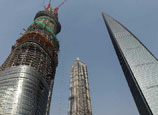
Gan said that tax increases are not necessary to increase social security and welfare. "Increased consumption and the retained profits of State-owned enterprises can provide the means for income redistribution, which means 3.8 trillion yuan each year," Gan said, noting that transfer payments can help ease a widening income gap while expanding domestic demand.
The coefficient is unlikely to see big changes in the next few years, Gan said, calling for authorities to restructure expenditures to focus on increasing social welfare instead of building roads and bridges.
Zheng Xinye, a professor at Renmin University of China, told the Global Times Sunday that the real Gini coefficient may be even higher than 0.61, since the super-rich are hard to reach for surveys.
"The widening income gap was caused by restrictions that kept small and medium-sized companies from entering high-profit sectors, as well as by employment discrimination," Zheng said. Data showed that the wage gap between finance and agriculture, which earn the highest and lowest wages respectively, has widened to a ratio of 4.2 in 2010 from 2.24 in 1997.
















 Spectacular images of erupting volcanoes
Spectacular images of erupting volcanoes


![]()
